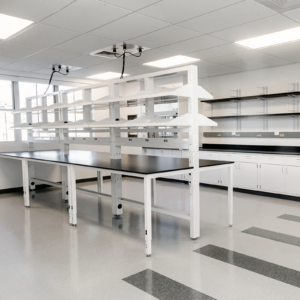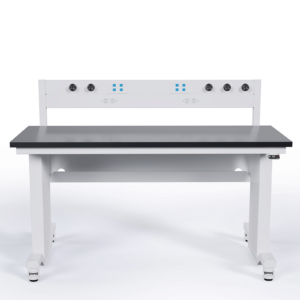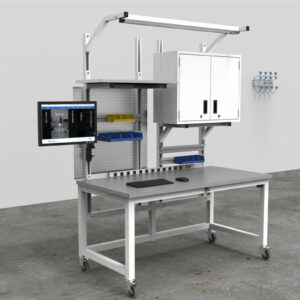What’s the ideal skill set for becoming a successful lab manager?
We take a look at the top 15 skills that you should develop to become a top-flight laboratory manager.

1. Mentoring
Let’s assume you have already obtained the requisite education credentials (typically a four-year BS in science, although some employers would prefer candidates with a Master’s degree), and you have been honing your skills as a lab technician for several years.
How does one make the leap from lab technician to lab manager?
What’s the next step?
For the majority of lab managers, their career break came as a result of finding a mentor within the organization where they work.
Someone who could help them grow into the management role by slowly allowing them to take on new responsibilities commensurate with their aptitude and developing skills.
If you’re fortunate enough to find someone who can help you up the career ladder in this way, don’t forget to pay it forward. As you advance in your position, be sure to identify a candidate working in your team for whom you can provide the same kind of mentoring skills for their career development.
2. Chief Problem Solver
From the perspective of many bench scientists and lab technicians, the role of lab manager can seem attractive for several reasons, including increased flexibility in the job, ability to control available resources, and, if we’re honest, increased compensation and future career opportunities.
But, once in the role, many new lab managers realize that, in the words of President Truman, “The Buck Stops Here.”
As problems arise in the laboratory, no matter how big or how small, lab managers have to come up with practical solutions quickly. This can make the role quite stressful, whether it’s due to malfunctioning lab equipment, vendors who fail to deliver reagents on time, or staff members who are away due to illness or other personal matters.

When faced with obstacles such as these, lab managers need to find answers without becoming overwhelmed by stress.
That’s why lab managers must develop the ability to prioritize and address more than one issue at a time (e.g. multitasking). And, as they gain experience, they’ll learn to solve problems as soon as they arise, to always be prepared with a backup plan, and to keep an eye on supply inventories and schedule proactive equipment maintenance.
3. Attention to Detail.
Details matter. A lot.
In the case of clinical testing laboratories, doctors make life or death patient medical decisions based on the results provided by the laboratory.
In scientific research, the credibility of the PI, and the institution as a whole, is on the line when data submitted for publication runs into trouble during the peer review process, whether due to lab errors or other inconsistencies that make the results impossible to replicate.
As a result, lab managers play a critical role in establishing and maintaining the highest quality control standards in an effort to increase precision and accuracy and reduce error and uncertainty in the results.
4. Safety First
Working in a laboratory science environment is not without risk.
Scientists and technicians handling corrosive agents or biological pathogens in a wet lab need to adhere to relevant safety regulations and best practices to minimize the risk of personal injury to the worker –
or to the community at large.
The lab manager plays a central role in ensuring that all laboratory equipment meets safety standards and that employees are well-trained and follow safety protocols.
In the larger context, it’s the responsibility of the lab manager to create a safety-first culture that prioritizes safe work practices and discourages risky shortcuts.

5. Demonstrate Leadership
Many first-time managers are under the misapprehension that their job is mostly about setting the rules and enforcing them.
Fortunately, over time, most (hopefully all) new managers begin to realize that their role is quite different. Rather than being a pure rule enforcer, the more sophisticated managers soon realize they are also very much in service to their employees, offering them assistance when they need help to work better and more efficiently, by taking care of the problems that get in the way of accomplishing their tasks.
Taking this approach to management will also make you a more informed leader, one who knows what’s happening on the ground in your organization. This will also allow you to make clear, timely decisions as needed.
6. Maintain Clear Lines of Communication
Whether one is working in a clinical diagnostic lab within a large healthcare institution, or at a university research lab, the position of lab manager serves as an important conduit of information between bench scientists and lab technicians and the greater organization at large – including key stakeholders, ranging from upper management, human resources, facilities and operations management – as well as government regulators and funding sources.
This places lab managers in a position where they need to manage both up the chain (to executive management, for example) and down the chain (to individual members of the lab staff).
Given this critical role, lab managers need to learn how to provide clear inbound and outbound communications, such as informing team members about important news, or executive managers with important updates on lab successes as well as how to chair a meeting effectively.

7. Build a Team Based on Strong Relationships
We talked at the outset about the importance of finding a mentor who can help those working at the bench began to take on manager roles and responsibilities.
Take what you learn from the relationship with a mentor and apply it to all the relationships within your team.
For example, if you work in a scientific research lab, are you making it a priority to get to know and to support your PI?
Take the time to celebrate individual successes as well as the achievements of the entire team.
And learn how to delegate tasks effectively when it’s appropriate to do so. Avoid the temptation to take on too many responsibilities because you feel like you’re the only one qualified (the hero syndrome). Not only will this lead to long-term burnout, it undermines the work team that you’re trying so hard to build.
8. Develop Project Management Skills
Successful project management is more than just tracking goals, due dates, and working hours to calculate a project schedule.
While having the skills to create, manage, and follow-up on project plans is crucial, project management also means being able to resolve conflicting priorities, such those caused by a rift between scientific managers over research priorities, budget cutbacks set forth by financial planners or government funding agencies, or unexpected delays caused by vendors or contractors who are unable to deliver on time.
Savvy lab managers recognize the need to always have a backup plan, and many of them rely on some of the sophisticated operational frameworks that are used across many industries, such as Six Sigma, which traces its roots back to lean manufacturing and the automotive industry.
9. Master the Budget Process
Are you ready to justify your existing lab budget expenditures or argue for increased funding?
If so, that’s good, because effective lab managers need to be able to clearly communicate what their needs are to secure funding that supports their ongoing operational goals.
For those working in government-funded research arenas (such as universities or government agencies), it’s very helpful to understand the ins and outs of grant writing and lobbying appropriations committees for funding.
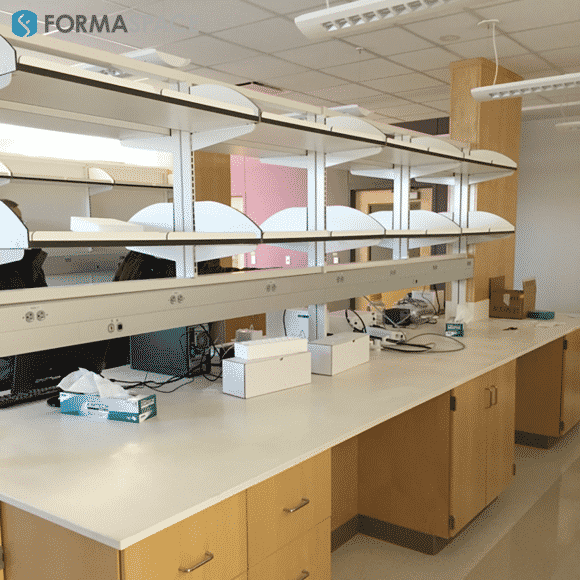
In a clinical laboratory setting where fee-for-service reigns, it’s just as important to track ongoing reimbursement payments and make sure your laboratory is fairly compensated.
Many lab managers find it helpful to attend online graduate schools to bolster their knowledge (and credentials) in finance, with many seeking an MBA degree, or, for those working in healthcare, an MHA (Master of Healthcare Administration).
10. Stay Up-To-Date
Scientific knowledge expense increases at a prodigious rate year after year, which makes it a challenge for lab managers to stay current on up-to-date best practices.
Yet, it’s easy to fall behind, which makes your skillset as a manager increasingly less relevant over time.
Make it a priority to set aside time to read the latest research on scientific discoveries, lab techniques, as well as advances in testing equipment and experiment techniques.
Some employers will provide financial assistance to participate in conferences or take classes or even attend degree programs, but even if they do not, invest in yourself by taking the time and paying for these things out of your own pocket if necessary.
Depending upon which laboratory sector you work in, there may be specific regulatory governance overseeing your operations. For example, all laboratories undertaking human testing must adhere to the Clinical Laboratory Improvement Amendments (CLIA) guidelines, so be sure to educate yourself about the critical rules that govern your lab organization.
Professional organizations, such as American Medical Technologists (AMT), the American Society for Clinical Pathology (ASCP), the Clinical Laboratory Management Association (CLMA), and the American Society for Clinical Laboratory Science (ASCLS) offer opportunities to keep up with the latest scientific and laboratory developments. Many of these also offer certificates that may be useful for furthering your career objectives, such as the Diplomate of Laboratory Management (DLP) credential offered by the ASCP.
11. Plan for the Future
Given the history of outbreaks of Ebola, SARS, and MERS during the past decade, clinical research and diagnostics labs should have been somewhat better prepared for the challenges posed in 2020 by the Coronavirus pandemic.
Nonetheless, many of us have been blindsided by the widespread shortages of critical laboratory items, ranging from PPE to chemical reagents used in diagnostic tests.
Planning for the future is hard but necessary. And there will be many lessons learned in the coming months as lab managers look back on what transpired this year and how they can be better prepared for the future moving forward.
One of the challenges in 2020 is the urgent need to reconfigure existing facilities to make them safer for lab technicians.
In some cases, this means changing bench configurations to create effective social distancing in the lab (such as placing one worker not two at a lab bench), or when that is not possible, adding transparent dividers help prevent Covid-19 virus transmission in the lab.

Customers who have installed Formaspace modular laboratory furniture are finding it much easier to make these changes, either by reconfiguring the furniture layouts (using ordinary hand tools) or by installing new transparent shield accessories designed to fit Formaspace workbenches.
12. Walk the Floor
A commonly heard critique of management is that they are aloof and out of touch with what’s going on among the worker bees.
Don’t let yourself become one of these stereotypically bad managers.
It’s an easy trap to fall into given the overflowing demand of requests that fill your inbox, voicemail, and text messages once you assume the role of lab manager – however, resist the temptation to sit at your desk all day long answering emails and returning phone calls.
Take the time to walk the laboratory each day to meet and greet each of your team members to find out firsthand what their thoughts, concerns, and suggestions are regarding how things are going and how things could be improved.
13. Listen First, Talk Later
If you’re talking, you’re not listening.
Reach out and gather information from all sources by listening to those on your team and those working in other departments.
Take a genuine interest in what other people have to say and share their enthusiasm about their work.
Create an open-door policy and let your staff know that you’re available to provide help.
Don’t forget that you can always praise employees in public, but the criticism should be delivered privately.
14. Embrace Data Automation Technology
The growth of data analysis (driven by advances in “big data” systems, machine learning, artificial intelligence algorithms, etc.) and automation continue to disrupt the way we do science.
Even if data analysis and automation seem to be unrelated to your current laboratory processes, the chances are, it won’t stay that way for long. Make a point of developing your skills in understanding data analysis and interpreting its findings.
Consider taking classes in data analysis, statistics, and machine learning theory as well as learning one or more data visualization tools (including R, Matlab, Tableau, or Python-based tools) to help you stay both current and relevant in your field.
You may not become a data scientist, but if you possess the ability to assess and interpret the information – and explain it effectively to other science professionals as well as laypeople – you will be ahead of the game.
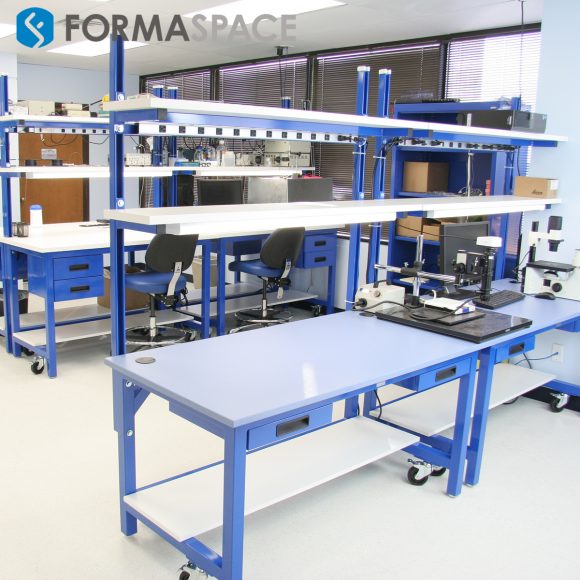
15. Be Respectful
It’s important that you treat everyone in your organization with respect, even if you’ve had disagreements in the past.
Don’t hold grudges.
Be fair.
Don’t practice favoritism.
Also, don’t overstep your role as a lab manager. Scientific researchers are professionals, and you need to respect the decisions they make when conducting experiments.
Finally, respect people’s time. You can do this by always being prepared; for example, when calling a meeting, make sure that you have prepared an agenda in advance, or when making a request, take into consideration how it may disrupt their ability to meet their current commitments.
Formaspace Is Your Laboratory Partner
Did you know that one of the leading custom laboratory manufacturing companies manufacturers all its products in the United States?
If not, it’s time to get to know Formaspace.
Here at our factory headquarters in Austin, Texas, we build custom laboratory furniture to make your laboratory operations more efficient and flexible.
Find out how we can work together.
Take the next step. Talk to your Formaspace Design Consultant today.





